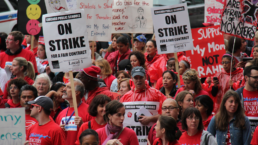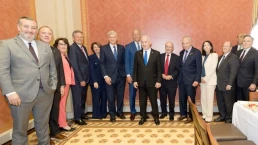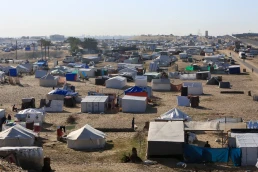C.M. Lewis interviews labor researcher Kate Bronfenbrenner about a case that could have widespread implications for unions across the country.
by C.M. Lewis, In These Times
The Supreme Court heard oral arguments January 10 in Glacier Northwest Inc. v. International Brotherhood of Teamsters Local Union No. 174, a court case that labor advocates say threatens the right to strike.
“The ability to withhold your labor is the one powerful tool throughout the history of unionization that has ensured workers can improve their working conditions,” Teamsters General President Sean M. O’Brien offered in a statement issued the same day. “This right is now on trial at the Supreme Court,” O’Brien said, calling on the court to affirm the rulings of lower courts. Noel J. Francisco, the Jones Day attorney representing Glacier Northwest, did not respond to a request for comment.

C.M. Lewis, working for In These Times, interviewed Kate Bronfenbrenner, director of labor education research and a senior lecturer at Cornell University’s School of Industrial and Labor Relations about the potential labor implications of the case. The interview has been edited for clarity and length.
C.M. Lewis: The Supreme Court just heard oral arguments in Glacier Northwest Inc. v. International Brotherhood of Teamsters. What question does the case put to the court?
Kate Bronfenbrenner: There’s two questions. The employer sued the union for tortious destruction of company property and is going after the Teamsters, and basically going after the government, arguing under the takings clause that it has to be reimbursed for the property.
The basic case is that when workers go on strike, by definition, the purpose of the strike is to cost the employer something economically. Our labor law balances employer rights and union rights; employers can lock workers out, and unions can go on strike. When employers lock workers out, it hurts workers, and when unions go on strike, the idea is that it would hurt employers. If workers strike at any employer, if they don’t do their work, most employers are going to lose some money.
Glacier Northwest’s argument is that cement workers going on strike caused some cement to harden when they walked off the job. Even though workers left the trucks running in order to try to protect the cement, the company didn’t get to the trucks to take care of it in time, and so the cement hardened. The company suffered losses, and because of those losses, the company is suing the union for tortious destruction of property.
The National Labor Relations Board ruled that it was the company that committed an unfair labor practice by retaliating against the union for going on strike. That has to go before the full board, but it has been declared a legal strike by the NLRB. And historically, the federal government does not interfere in NLRB cases, and the courts do not interfere in NLRB cases.
Recent Posts
Why Are Democratic Lawmakers Still Meeting With Netanyahu?
July 12, 2025
Take Action Now Pictures show Democrats like Chuck Schumer standing next to Netanyahu, smiling.By Sharon Zhang, Truthout A bipartisan group of…
Stop Israel’s Dystopian “Humanitarian City” Plan—Before It’s Too Late
July 11, 2025
Take Action Now For the past 20 months, the world has watched—and largely enabled—a genocidal campaign in Gaza. Over 55,000 Palestinians have been…
The “Liberal” International Order Is Criminalizing Palestine Protests
July 11, 2025
Take Action Now As Western governments repress Palestine solidarity and enable Israel’s impunity, the “liberal international order” is no longer…
Politicians Are Betraying Gen Z On Climate
July 10, 2025
Take Action Now While Gen-Zers thrift, knit, crochet, and find other ways to reduce our footprints, Trump and the GOP are greenlighting more climate…




